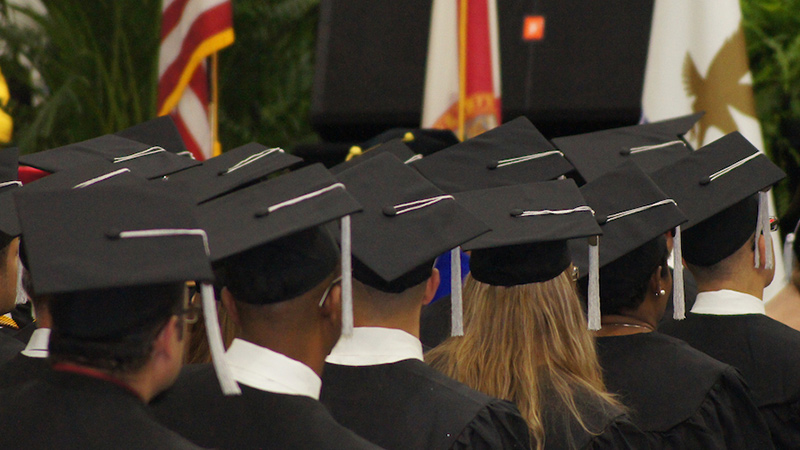Stay Up to Date
Submit your email address to receive the latest industry and Aerospace America news.
Bill sponsor hints grad student tax is negotiable
Dec. 16 update: The amended Tax Cuts and Jobs Act released Dec. 15 by a joint congressional conference committee excludes the rule that would have required graduate research assistants, such as doctoral candidates, to pay income tax on tuition waived or otherwise covered under their research contracts. The bill now goes back before the full Senate and House of Representatives. The article below was published on Dec. 1.
The top proponent of a Republican tax plan that would raise taxes on university graduate assistants is expressing flexibility about the provision amid student protests and warnings from administrators about its impacts on the cost of research and a possible chilling effect on American competitiveness.
Republicans in Congress have advanced two versions of the Tax Cuts and Jobs Act. A version passed by the House of Representatives before Thanksgiving would count a grad student’s reduced or waived tuition as income following the fifth year of post-secondary education, with the amount partially taxed that fifth year. The Senate version does not contain the provision.
If the House provision were to become law, “funding agencies” — typically corporations and government organizations — “will have to give us more money, or if they don’t give us more money, less research will get done,” says Marc Mignolet, who heads the aerospace and mechanical engineering graduate programs at Arizona State University. Mignolet’s program has about 300 master’s degree students, and 150 pursuing doctorates, many of whom have research assistantships.
In an industry in which a new engineering grad with a bachelor’s degree can earn $60,000 a year, it’s already a big challenge to recruit graduate students to live on a stipend of $25,000, Mignolet says. He suspects that the only way to counteract the effects of the tax proposal in Washington would be to raise the students’ living stipends — also frequently paid under the research grant the student was brought in to support.
U.S. Rep. Diana DeGette, D-Colo., addressed the House plan during the AIAA-Rocky Mountain Section’s Annual Technical Symposium in November in her Denver district. DeGette described the provision as “just outrageous and overly burdensome on people we need in our economy.”
“It would cause tax burdens for many graduate students to go up something like $10,000,” DeGette said. “It’s difficult to see how anybody could actually take a position as a graduate assistant if you have to pay that burdensome amount of taxes.”
Grad students across the country walked out onto their university lawns Nov. 29 to protest the proposed tax increase.
The sponsor of the House version of the bill, Rep. Kevin Brady, R-Texas, said in an appearance Nov. 28 at the American Enterprise Institute think tank that “there may be” some flexibility in the House regarding the graduate student provision.
“We’re hearing from lawmakers that this provision at the university level is an important one,” he said in the appearance, according to a video. “So, as we move forward with the Senate in a conference committee, we’re going to address issues like that.”
Fairness was the motivation for the proposal to tax graduate students, Brady said. He asked the audience to imagine a graduate student who today gets tax-free tuition assistance from a university. “If you’re that same student, pursuing that same degree, but you’re working across the street at a company, trying to earn the money for that tuition, and working very hard — well, you’re taxed for every dime of it. So, in the past, there’s been a question of, ‘Well, wait a minute, is that fair?’ Same type of people, pursuing the same great degrees, working really hard, one tax-free, one not.”
Others suggested there could be unintended consequences if the proposal were to become law. A fact sheet by the American Council on Education characterizes the existing tax approach as “crucial” to STEM fields, reporting that science, technology, engineering and math account for degrees of more than half of graduate students who don’t pay tax on their tuition waivers.
The National Association of Graduate-Professional Students predicts that the provision would disincentivize attending graduate school and make the U.S. less economically competitive, a view shared by Mignolet at Arizona State.
“The work that we do that is supposed to advance the capabilities — of companies, especially — is going to get reduced, so the competitive edge of the United States, in the long run, would probably decrease,” Mignolet said.
“What we’re going to have to do, if it somehow makes it into the final bill, is we’re going to have to regroup at the state level,” DeGette said.
“We’re hearing from lawmakers that this provision at the university level is an important one. So, as we move forward with the Senate in a conference committee, we’re going to address issues like that.”
Rep. Kevin Brady, R-Texas, sponsor of the House version of the bill
About Amanda Miller
Amanda is a freelance reporter and editor based near Denver with 20 years of experience at weekly and daily publications.
Related Posts
Stay Up to Date
Submit your email address to receive the latest industry and Aerospace America news.




